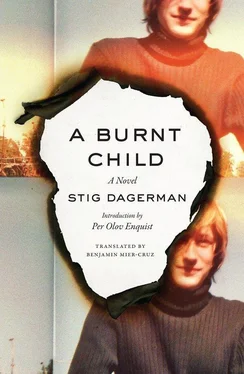So he picks up the receiver and says hello.
But it’s a woman’s voice that he doesn’t recognize, and the voice says:
How are you feeling, my dear? Tired?
Tired? he asks. Who is this?
It’s Gun, whispers the mysterious woman.
Then she is very frightened. He can tell by her sobbing gasps how terribly frightened she is. He isn’t afraid at all.
Who is this? she whispers.
This is Bengt, Bengt Lundin. He spit the ts into the receiver. I’m sorry, she says. And she is gone.
He hangs up. Shortly after, an attendant grabs the telephone and calls a cab for a drunken person. And when the father with clean hands emerges from the restroom, the son is sitting alone on a chair beside the telephone. He is not smoking. He is just sitting. He has the corner of a handkerchief between his teeth. He always chews on something when he is upset, either his nails or a handkerchief.
They walk back to the private room together. It’s almost dark now, but the flame will continue to burn for a little while longer. The son is walking behind the father, but once inside he sits on the opposite side of the table. He wants to look him in the eye. He wants to see whether his eyes are afraid. But the father doesn’t look at him. The father is standing next to the deceased’s cold chair and looks down at her empty plate. But it’s no longer empty. The bill is on the mother’s plate.
The son waits and waits. If his father’s eyes are afraid, he will make them even more afraid. But if they are not afraid, he is going to hurt them, hurt them as much as he can. More than he has ever hurt anyone in his entire life. He gazes at his bowed head and his thin, messy hair. He gazes at the wide, red face, which the light is struggling to illuminate, lighting it less and less. Then he notices that his eyelids are twitching, maybe from fatigue, maybe from fear.
Then he realizes how he can make the twitching worse, so horribly excruciating that every time his eyelids close, they will close to a burning candle. He cups his hands around the flame like a shield. There is only emptiness above the flame and a few centimeters of wax underneath it. But his strong hands surround all of it. You cannot wake the dead. Not for yourself. Because, for you, the dead stays dead. But you can resurrect her for others. You can say to someone else, She’s alive, you know. The candle is still burning. The candle will not go out. So she is alive.
The candle is burning inside his hands, which swelter over the flame. His whole body is blistering. It is a scorching heat, but he needs it. He needs to burn.
Someone called, he says.
He has perfume in his mouth, so it didn’t sound like he wanted it to. The father looks up from the bill. He is anxious but not particularly fearful. Nevertheless, the candle is blazing. But he can’t really see it. The sons’ hands are darkening it.
Oh, he answers, who?
A woman, says the son.
I see, the father replies. What did she say?
She only apologized, the son whispers. Her name was Gun.
Immediately, the father’s eyes shoot up from the bill and look over the son’s head and up to the ceiling. Finally, the mask thuds off, the widower’s dismal mask. And behind the mask is joy, a great and terrible joy. After all, joy can look like fear in anyone who is forced to mourn. He is afraid to reveal his happiness, but there’s nothing he can do to suppress it. The dead cannot haunt someone made happy by the living. And the son can always keep his hands there a little while longer, but even in this moment he knows that his hands are only filled with emptiness, that there is only emptiness above the candle and emptiness beneath the clump of wax, and that to grieve is to have an empty hole inside of you, a vast empty hole that no tears can fill.
At that moment, the son burns his hands. Someone walks through the doors, someone who wants to be paid, and the flame flutters again. First, to one side and burns his left hand, and then to the other side and burns his right hand. Then the burnt son pulls his hands back. The one who entered has stopped at the door and is silent. The whole room is silent. The whole world is silent. The son’s tongue tastes like perfume, so he is unable to say a word. The perfume of the woman he hates is so bitter that he can’t even scream. He can only swallow, and swallow some more, and raise his burnt hands up to his parched eyes.
Grinning, the father blows out the candle.
A Letter in February from Himself to Himself
Dear Bengt!
It’s been a while since I last wrote to you. Last time, I wrote that Mama was dead. Now she’s dead and cremated. Her urn is on a shelf in some building at the cemetery. We were there on Sunday—Papa, Berit, and I. You know what it’s like there. Just a big gray storeroom for the ashes of the dead. Berit cried the whole time. I for one felt nothing. As we walked out, Papa said the urn was ugly. So I said it was beautiful. When we got home Berit made coffee, and the phone rang while we were drinking it. When Papa came back, he said it was a coworker who called. He didn’t need to say that.
Berit left early. She had a headache. After she left, Papa said that Berit was ugly. So I said she was nice. Then he asked me if I missed Mama. I said that I knew she was dead. Then Papa said he thought that was good and that I was sensible, but I didn’t understand then what he meant. That evening we drank some more coffee and ate the rest of the gingerbread from Christmas. I reminded Papa that Mama had baked it, and he replied that she had always baked well. Then he went out to buy the paper. It was snowing, and he doesn’t like going out in the snow.
He came back at two in the morning. He arrived in a taxi and wasn’t sober. He didn’t have the paper with him, and he didn’t like that I asked him about it. Nor did he appreciate that I was still up studying. Otherwise, he usually likes it when I stay up late to study. He wants me to be something, the sooner the better.
As he got undressed, I asked him about it. You know what about. About whom. Are you spying on me? he asked. I replied that I wasn’t spying, but that I still knew everything. Then he shouted that he didn’t have to answer to me. I wasn’t scared. No, I answered, but to Mama. He grabbed me hard by the shoulders, but I didn’t break free. You know Alma is dead, he said. He always calls her Alma when he’s drunk. Yes, I answered, but she hasn’t always been. Then he asked me if I thought she knew about it. Yes, I said, she knew about it for a while. It was a lie, but he let me go and shut up. She was sick, I added, and you still did it. Then he repeated that he didn’t have to answer to me. I asked him why. You’re young, he said. I asked him if there was anything wrong with being young. He responded that sons can’t hold their fathers accountable. I asked him why not. Because sons are young and fathers are old, he answered. Then I asked whether sons couldn’t be better than their fathers. It’s not a matter of being better, he said. Then what is it a matter of? I asked. It’s a matter of having experience, was his answer. You get that over time. Then I don’t want that kind of experience, I yelled, not even if it’s thrown at me! Then that’s too bad for you, son, he answered and tried to touch me. I didn’t let him.
But after I had gone to bed, he came in through the darkness and sat on my bed. After sitting silently for a while, he asked, Do you think she took it hard? Yes, I said after a while, she always cried when you were gone at night. Really? he replied and said nothing more. But as he was leaving, I yelled at him. I don’t want to see her, I shouted, ever! Then he replied, She is going to be your mother, so you have to! I didn’t sleep that night. Instead, I took her handkerchief from my dark suit and tried tearing it to pieces. But it was too strong. Stronger than I was. So I went back to bed. But I just lay there, hating the scent all night.
Читать дальше












